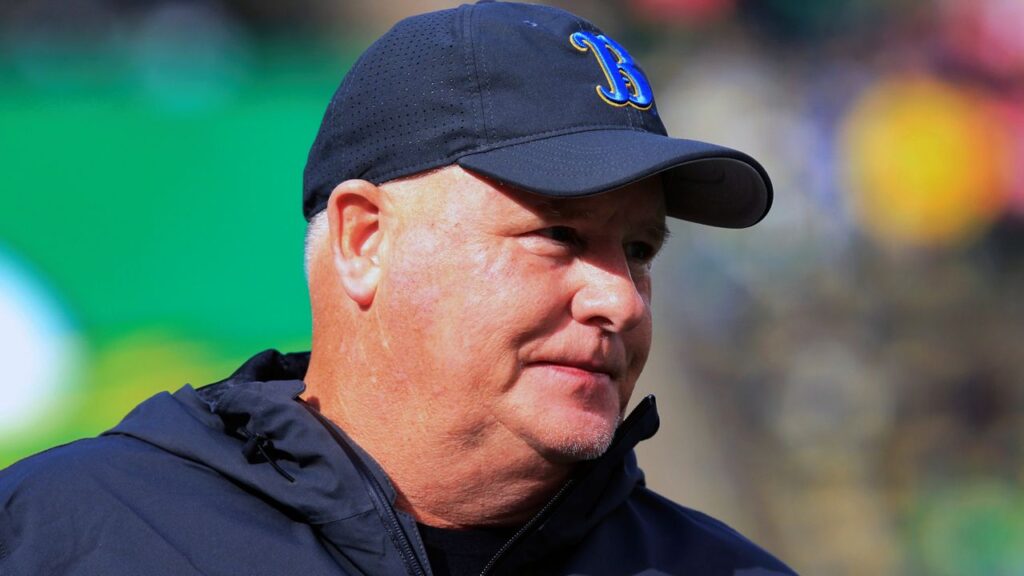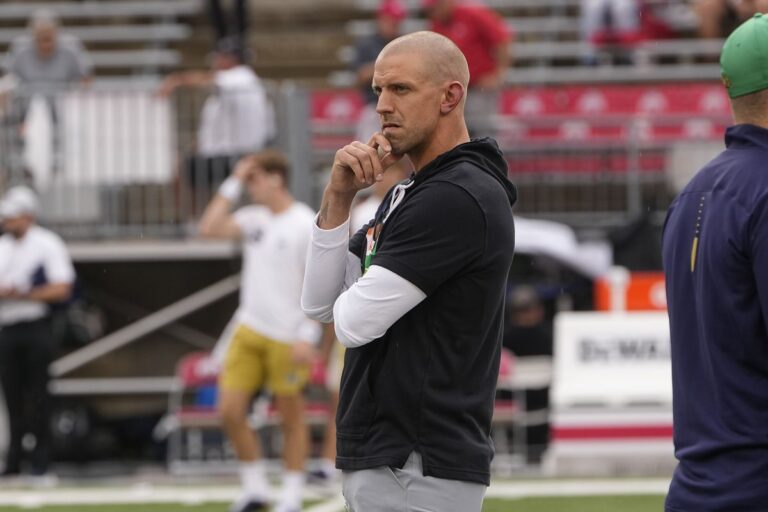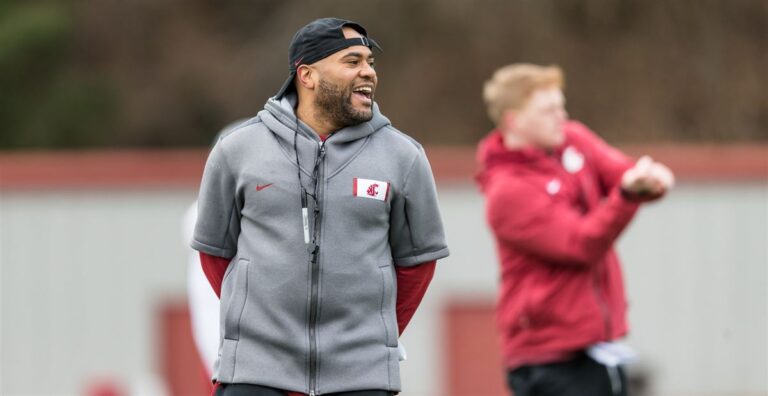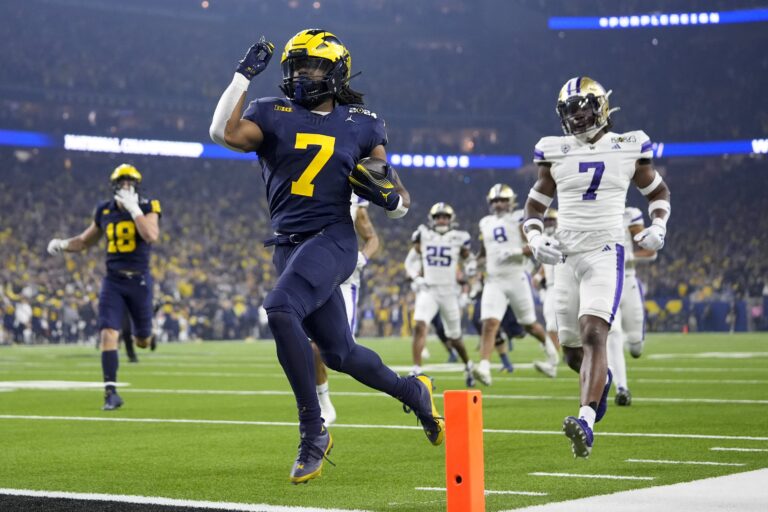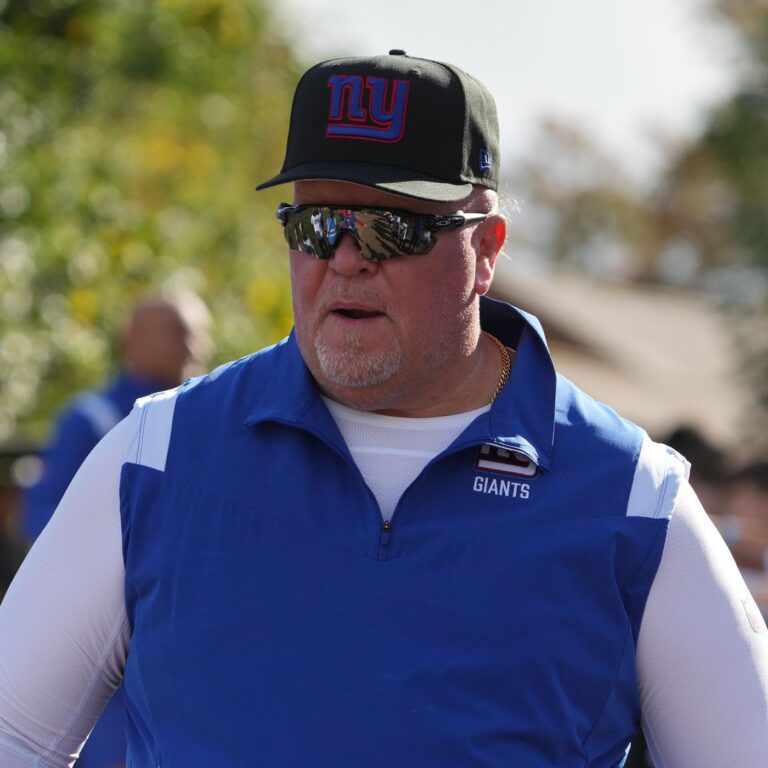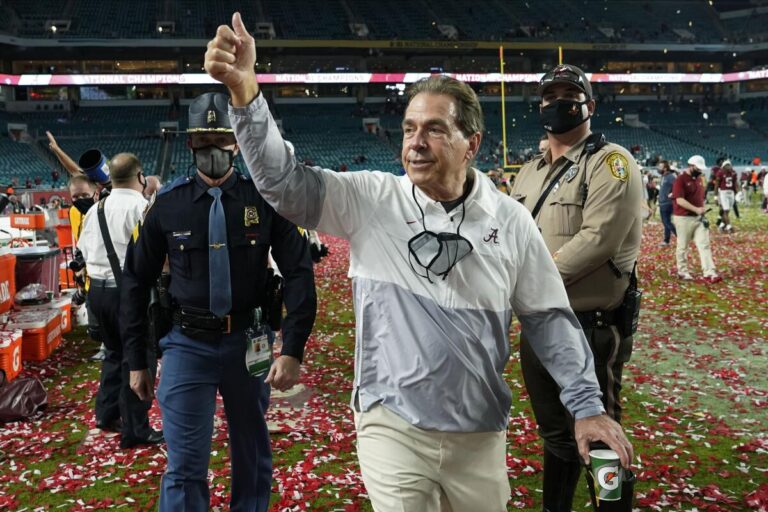The Startling Shift: Chip Kelly’s Departure from UCLA
-
To read 8 min.
-
Published
-
Comments 0
Key Points
- Chip Kelly transitions from head coach at UCLA to offensive coordinator at Ohio State, highlighting a strategic career move amidst mixed success with the Bruins.
- UCLA’s football program faces challenges of consistent performance and financial deficits, prompting a strategic shift to the Big Ten for greater revenue opportunities.
- The next UCLA head coach must leverage Southern California’s rich talent pool and innovative strategies to rebuild the program and engage the fan base, especially considering the logistical challenges of the Rose Bowl’s location.
- UCLA’s move to the Big Ten represents a gamble on future success, requiring a blend of financial stability, competitive excellence, and strategic vision to navigate the complexities of modern college football.
A New Chapter Unfolds
Chip Kelly’s departure from UCLA to Ohio State as an offensive coordinator has sent shockwaves through the college football landscape, challenging the norms of coaching trajectories. This move is layered with implications, both for Kelly and the institutions involved. At 60, Kelly’s decision to step away from the head coaching spotlight at UCLA, despite a record that hovered around the .500 mark, hints at a deeper calculus involving personal and professional satisfaction. His tenure at UCLA, marked by a 35-34 overall record and a balanced 26-26 in league games, showcased moments of potential but fell short of the high expectations set upon his arrival. The narrative of Kelly’s coaching career is one of innovation and success at various levels, but at UCLA, the breakthrough success remained elusive, prompting a reevaluation of his career path.
The Bruins’ performance under Kelly, particularly the 8-5 record last season, reflects a nuanced story beyond the surface-level statistics. Although the record appears competitive, a closer examination reveals that it was bolstered by a non-challenging non-conference schedule, with the team securing just one victory over a ranked opponent. This context paints a picture of a program that, despite possessing the elements for success, could not consistently compete at the highest levels under Kelly’s stewardship. The decision to leave, therefore, opens up discussions about the pressures and expectations on head coaches in top-tier college football programs and the personal toll it takes.
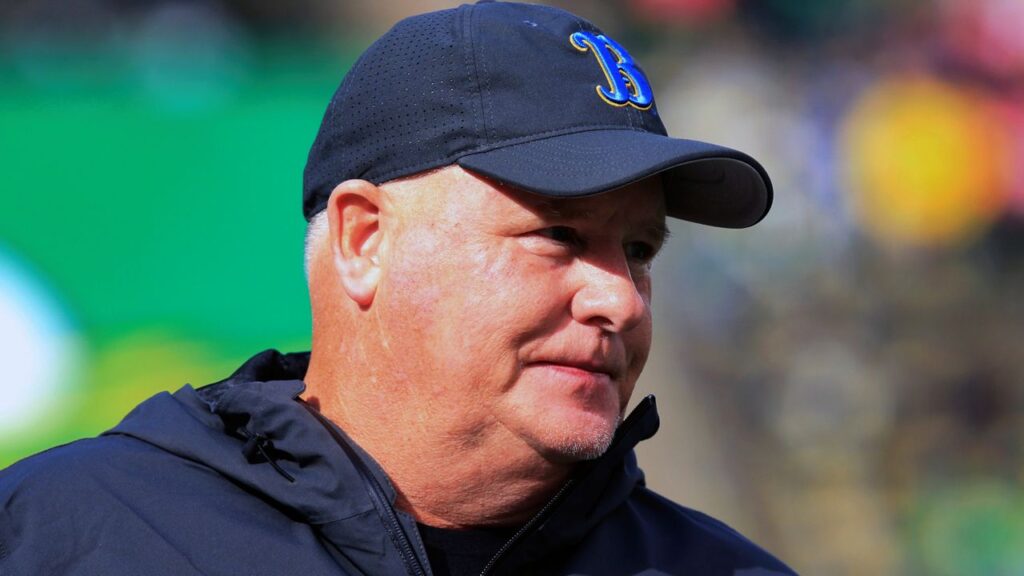
The Allure of Ohio State
The transition to Ohio State represents not just a change of scenery for Kelly but a strategic shift to a role where the pressures of head coaching give way to the specialization and focus on offensive strategy. Ohio State’s football program, with its rich tradition of excellence and a pipeline of top-tier talent, presents an ideal setting for Kelly to apply his offensive acumen without the overarching responsibilities of program management. This role at Ohio State, likely accompanied by a lucrative salary, offers Kelly the opportunity to be part of a championship-contending team, further enhancing his legacy in a different capacity. It underscores the evolving nature of coaching careers, where a move traditionally seen as a step back can, in fact, be a strategic pivot towards personal and professional rejuvenation.
UCLA’s Quest for Revival
UCLA’s football program stands at a crossroads, with Kelly’s departure underscoring the persistent challenges of returning to national prominence. The Bruins’ struggle to capitalize on their inherent advantages—elite academic reputation, prime Southern California location, and access to a hotbed of high school talent—has been a recurring theme through various coaching regimes. The program’s sporadic success in the 21st century, punctuated by rare appearances in the AP Top 25 and a lack of 10-win seasons, speaks to the difficulty of translating potential into consistent on-field success. As UCLA prepares for its transition to the Big Ten, a conference known for its competitive depth and financial prosperity, the task ahead is daunting. The move, driven by financial necessity in the face of significant athletic department deficits, represents a gamble on the future—a future where UCLA must not only navigate the financial intricacies of collegiate athletics but also reassert itself as a competitive force on the national stage.
The financial challenges faced by UCLA’s athletic department in recent years have been staggering, with deficits running into the tens of millions, highlighting the fiscal realities that often dictate strategic decisions in college sports. The Big Ten’s promise of substantial revenue shares presents a lifeline for the program, yet the financial benefits alone will not suffice. The onus is on UCLA to leverage this opportunity to enhance its competitiveness, a task complicated by the lack of immediate boosts in recruiting or transfer interest following the announcement of the conference shift. This scenario places a spotlight on the critical importance of strategic vision and leadership in navigating the complexities of modern college football, where financial acumen must be matched by competitive excellence.
Welcome Chip Kelly, OC/QB Coach ‼️
— Ohio State Football (@OhioStateFB) February 10, 2024
#GoBucks pic.twitter.com/AWyF4KuN4e
A Path Forward Amid Challenges
As UCLA looks to the future, the blueprint for success involves more than just financial stability; it demands a holistic approach to building a competitive program. The next head coach will inherit a landscape transformed by Kelly’s tenure, with the expectation of igniting a resurgence in a program rich with potential. This requires a keen eye for talent, an innovative approach to offense, and a relentless pursuit of excellence in recruiting—areas where Kelly showed promise but could not fully capitalize. The challenge is not insurmountable; Southern California remains a fertile recruiting ground, ripe with talent ready to be molded into a cohesive, winning team. However, the competition is fierce, and UCLA’s next leader must navigate the intricate dance of collegiate athletics with a strategic vision that aligns with the realities of the Big Ten and the evolving landscape of college football.
The quest for revival is not just about wins and losses; it’s about rebuilding a culture of excellence and excitement around UCLA football. The Rose Bowl, with its historic allure and picturesque setting, has the potential to be a fortress for the Bruins, but filling its vast expanses requires a product on the field that can energize a fan base and attract top talent. The challenges of fan engagement and the logistical hurdles posed by the stadium’s location are real, but they are not insurmountable. A successful program, built on innovative play, strategic recruiting, and a reinvigorated connection with the community, can transform these challenges into assets, turning the page on a new chapter of UCLA football that honors its rich tradition while boldly stepping into the future.
In Conclusion: Embracing Change
Chip Kelly’s departure from UCLA is more than a footnote in the annals of college football; it is a moment of reflection and potential turning point for a storied program. As UCLA embarks on this new era, the focus shifts from what has been to what could be. The path ahead is fraught with challenges, but also brimming with opportunities. In the competitive cauldron of the Big Ten, UCLA must carve out its identity, leveraging its unique strengths to build a program that can compete with the nation’s elite. This moment of transition is a test of resilience and vision for UCLA, a chance to redefine what success looks like in Westwood. With the right leadership and a renewed commitment to excellence, the Bruins can turn this period of change into a catalyst for revival, reminding the college football world of the enduring legacy and potential of UCLA football.
FAQs
- Why did Chip Kelly leave UCLA for Ohio State?
Chip Kelly left UCLA for Ohio State to take on the role of offensive coordinator, a move that allows him to focus on his offensive strategy expertise without the broader responsibilities of a head coach. This decision came after a tenure at UCLA that saw mixed results and may also reflect personal and professional considerations for a less demanding role in his career.
- What challenges does UCLA’s football program face?
UCLA’s football program faces several challenges, including inconsistent on-field performance, financial deficits, and the need to rebuild its competitive edge, especially with the upcoming move to the Big Ten. The program must also navigate logistical challenges related to fan engagement and the Rose Bowl’s location to revitalize interest and support.
- What are the expectations for UCLA’s next head coach?
The next head coach of UCLA is expected to harness the potential of Southern California’s talent pool, implement innovative and competitive strategies, and rebuild the program to achieve consistent success. They must also address the challenges of fan engagement and adapt to the competitive and financial landscape of the Big Ten.

